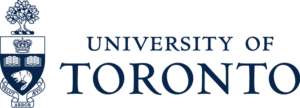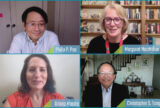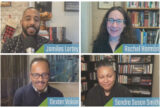
Image courtesy Adobe Stock
Civilization faces existential threats—pandemics, climate change, nuclear proliferation, runaway technologies—that seem to require international collaboration. Meanwhile, China and the United States are engaging in greater conflict with each other, and embracing unilateralism in matters of trade, technology, national security, and the sovereignty of their neighbors. To what extent will nations, businesses, NGOs, and individuals across the globe have to take sides if the U.S.-China contest becomes a new Cold War? What are the perils of the bitter competition between China and the West over 5G networks and artificial intelligence? And is it possible to create a collaborative and resilient international order to solve big problems, or are we headed toward a decoupling of East and West?
University of Toronto historian and author of War: How Conflict Shaped Us Margaret MacMillan, FSI Center Fellow at Stanford University and Defense and Foreign Policy Fellow at the American Enterprise Institute Oriana Mastro, and UCLA Anderson distinguished professor Christopher S. Tang visit Zócalo to contemplate how the world, and our lives, would change during a new Cold War.
Zócalo and the University of Toronto present The World We Want, an event series exploring our current societal, political, and economic challenges and how we might emerge from the current moment.
Zócalo and the University of Toronto thank the Consulate General of Canada in Los Angeles for supporting The World We Want.
The Takeaway
The U.S.-China Rivalry Isn’t a New Cold War; It’s Bigger Than That
The Fact That the Two Countries Are Interdependent Makes Both War and Peaceful Cooperation More Possible
The rivalry between China and the United States is not a new Cold War, but it involves profound competition along economic, technological, and economic lines that create dilemmas for other …
Past Events in this Series
This Period of Crisis Can Help Lead Us ‘Closer to the Good’
From Studying Ancient Wisdom to Learning From Modern Emergencies, We Have the Tools to Be Better
The final Zócalo/University of Toronto The World We Want event, “Can We Still Find the Good in the World?,” delved into a wide-ranging discussion of what finding the good in …
To Reckon With the Post-Apocalypse, Cities Need to Better Invest in Community
Urban Areas Need the Buy-in of Locals if They Want to Address Major Problems From Public Health to Climate Change
Most people in the world today live in cities. So it is unsurprising that cities have weathered the extremes of an extreme historical moment: they are where the pandemic first …
Law Enforcement Isn’t Going Away—That Doesn’t Mean It Can’t Be Reimagined
‘De-Tasking’ Non-Crime Police Work Could Go a Long Way Toward Building a Safer Society
If our communities had fewer police officers doing fewer tasks, they could become less dangerous places for everyone, said panelists during at the debut event of a new Zócalo/University of …









